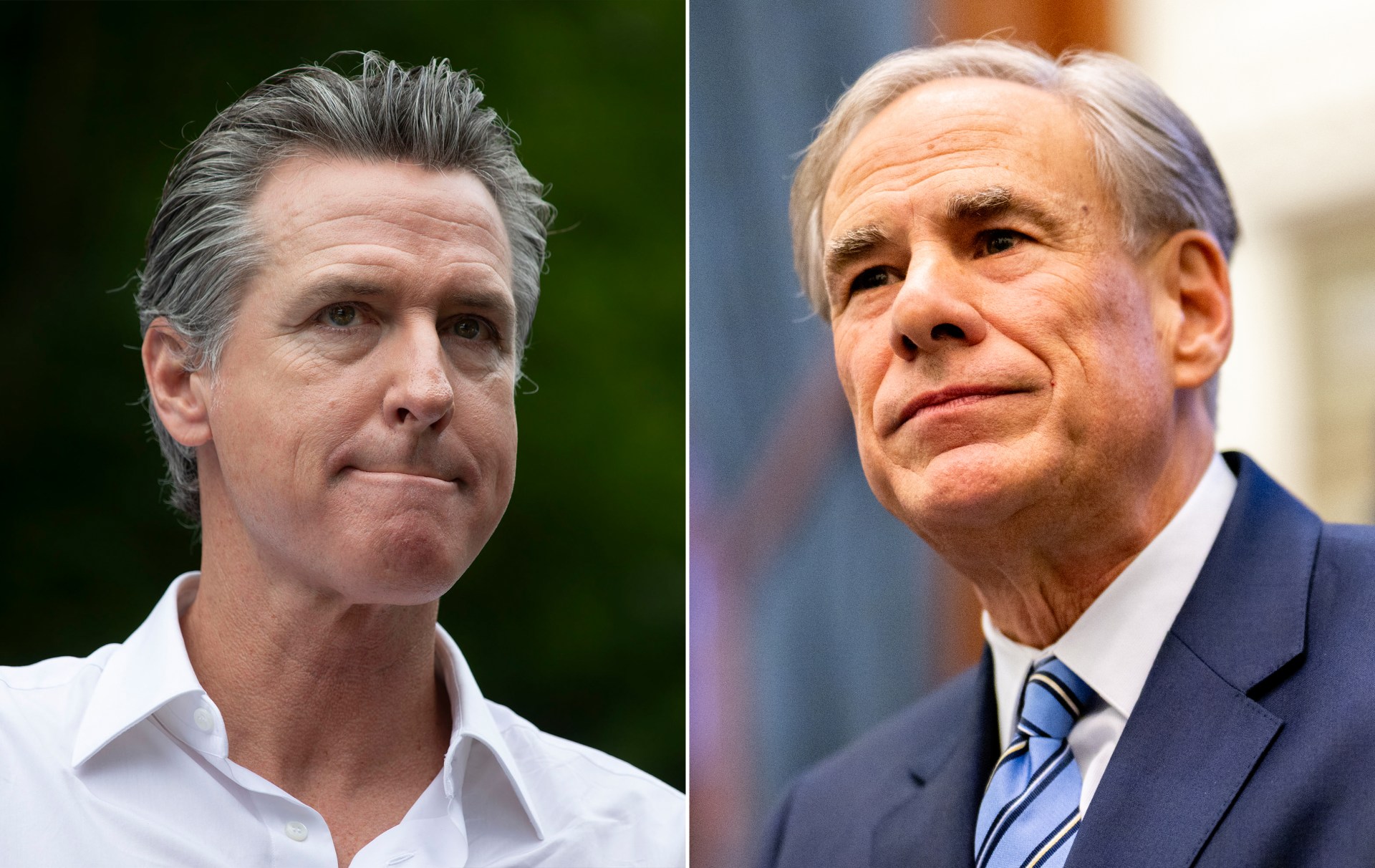Happy Tuesday! Before we get to the news, a quick note from Executive Editor Declan Garvey: We’re thrilled to welcome Ross Anderson to The Dispatch as the next editor of TMD. Ross has been in our orbit for years—he first wrote for us in 2021—but he officially started at The Dispatch yesterday after stints at The Spectator, New York Sun, and Tablet, and working as a researcher for Dispatch contributing writer Jesse Singal. He’s based in London, and we look forward to him working his love of technology, culture, and cats into the newsletter.
Because she is back in the U.S. and no longer has the time zone advantage that came with living in Tel Aviv, Charlotte Lawson is going to shift to the editing desk full-time, helping us bolster our national security and foreign policy coverage. Charlotte did a terrific job helming TMD since January, stepping up at a key moment and ensuring that our coverage of the Trump administration’s early days and an increasingly chaotic world order was accurate, balanced, and accessible. We’re excited for her to bring her talents to the rest of the work we’re doing here at The Dispatch.
You’ll see both Ross and Charlotte’s bylines on TMD the next few days as we make the transition, but keep an eye out for some additions and improvements to the newsletter coming soon!
Quick Hits: Today’s Top Stories
- Texas Republican lawmakers voted to issue civil arrest warrants on Monday for state House Democratic legislators who departed the state to stall a GOP-led redistricting bill. While Republicans hold a majority in the state legislature, by leaving the state, Democrats prevented the quorum necessary to hold votes in the House. Republican Gov. Greg Abbott said he deployed the Texas Department of Public Safety—a state force with no jurisdiction outside Texas’ borders—to “arrest and return every derelict House Democrat to the Texas Capitol.” In a separate statement, Abbott added that Democratic lawmakers “forfeited their seats and are facing potential felony charges.”
- Kremlin spokesman Dmitri Peskov on Monday publicly responded to President Donald Trump’s decision to reposition two nuclear submarines to “appropriate regions” on Friday. “We believe everyone should be very careful about nuclear rhetoric,” Peskov said, adding, “We do not think there is talk of any escalation.” He added that Russian President Vladimir Putin is prepared to meet with Ukrainian President Volodymyr Zelensky if the “necessary work is done at the expert level and the necessary distance has been covered.” White House special envoy Steve Witkoff is expected to travel to Russia on Wednesday or Thursday for a final attempt to secure a ceasefire before Trump’s August 8 deadline, after which Trump has said Moscow can expect new sanctions if a deal has not been struck.
- Israeli Prime Minister Benjamin Netanyahu will reportedly push his security Cabinet to approve a major military offensive into Gaza with the aim of achieving “a full occupation” of the Strip, several news outlets reported on Monday. The decision has reportedly split members of the Cabinet, with Israel Defense Forces Chief of Staff Lt. Gen. Eyal Zamir and Mossad chief David Barnea among the officials pushing for continued ceasefire and hostage deal negotiations. An Israeli official told CNN that Netanyahu was now seeking to free the remaining 50 Israeli hostages through the “military defeat” of Hamas, adding that the prime minister supports “the entry of humanitarian aid into areas outside the combat zones and, as much as possible, into areas not under Hamas control.”
- The Israeli Cabinet on Monday voted unanimously to remove Attorney General Gali Baharav-Miara from her position, Justice Minister Yariv Levin announced. Israel’s Supreme Court issued an injunction to temporarily block the move until courts rule on the legality of firing Baharav-Miara, who is prosecuting Prime Minister Netanyahu for corruption. Prior to her dismissal, the high court advised the Cabinet against making the move, warning it would intervene through an injunction if the firing went ahead. Responding to the move in a letter to State Attorney Amit Aisman, Baharav-Miara dismissed the firing as “unlawful,” vowing to continue her job “impartially, professionally, and honestly.”
- Trump on Monday announced plans to raise tariffs on Indian goods, a move he threatened last week in response to the country’s purchases of Russian oil. Indian Foreign Ministry spokesman Randhir Jaiswal said Friday that New Delhi’s relationship with foreign nations “should not be seen from the prism of a third country,” and, on Saturday, news outlets reported that India would not reduce its Russian oil purchases. In response, Trump vowed to “substantially” increase tariffs on Indian products, without specifying a certain rate, and added that India doesn’t “care how many people in Ukraine are being killed by the Russian War Machine.”
- The European Union on Monday announced a six-month suspension of its planned retaliatory tariffs on the American goods, which were set to take effect on Thursday. An EU spokesman said the delay will allow further discussions on the U.S.-EU trade deal announced on July 27 that set a 15 percent tariff rate for most European imports to the United States. The specific terms of the agreement have not yet been determined.
- A gunman stormed an orphanage outside the Haitian capital of Port-au-Prince early Sunday morning, kidnapping nine people, including an Irish missionary, multiple employees, and a 3-year-old child. Local officials said the gunman did not open fire and that the abductions were “planned.” The nation of Haiti, particularly the area of Port-au-Prince, has for years been overrun by gang violence. The orphanage’s parent organization, Nuestros Pequeños Hermanos International, stated it was not making public specific details, citing “the evolving nature of this incident.”
- GOP Rep. Nancy Mace of South Carolina on Monday officially announced her candidacy for the state’s 2026 governor’s race, after hinting at the move last week. Mace—who, in the direct aftermath of the January 6, 2021, Capitol riots, criticized Trump for promoting “clearly unconstitutional theories that risk the stability of our nation” in a joint statement with other Republican House members—has in recent years remodeled herself as a reliable ally of the president, describing herself on Sunday as “Trump in high heels.” She joins fellow GOP Rep. Ralph Norman, state Lt. Gov. Pamela Evette, and state Attorney General Alan Wilson in the crowded Republican primary race.
Turmoil at the BLS

Back in April, the Bureau of Labor Statistics (BLS) released its nonfarm payroll numbers for March—a strong 228,000 increase in jobs that clocked in far above estimates. “GREAT JOB NUMBERS,” Trump said on Truth Social. “WE CAN’T LOSE!!!”
Oh, how times have changed.
On August 1, the bureau published its monthly jobs report for July, assessing that the U.S. economy added 73,000 new positions—significantly lower than the already tepid 100,000 Dow Jones estimate. In a striking change, the May and June numbers were also revised down by a combined 258,000 jobs. This time, Trump was not so pleased. Following the report’s release, the president accused BLS Commissioner Erika McEntarfer of skewing the agency’s data to undermine him politically and ordered her dismissal, effective immediately.
Despite Trump’s insistence that McEntarfer manipulated payroll data, the White House produced no evidence indicating that the BLS numbers were inaccurate. The Trump administration is now moving toward selecting a new bureau head, with White House National Economic Council Director Kevin Hassett saying in an interview with NBC News’ Meet the Press that Trump “wants his own people there.”
Analysts warn that Trump’s meddling could undermine the independence of the Labor Department agency, with the potential for unforeseen consequences. If businesses think that the federal government’s employment statistics are being shaped by political pressure, they may discount the data entirely.
“I was just informed that our Country’s ‘Jobs Numbers’ are being produced by a Biden Appointee, Dr. Erika McEntarfer, the Commissioner of Labor Statistics, who faked the Jobs Numbers before the Election to try and boost Kamala’s chances of Victory,” Trump claimed on Truth Social, without evidence. “I have directed my Team to fire this Biden Political Appointee, IMMEDIATELY. She will be replaced with someone much more competent and qualified. Important numbers like this must be fair and accurate, they can’t be manipulated for political purposes.”
In another post, Trump provided more context for the firing. “In my opinion, today’s Jobs Numbers were RIGGED in order to make the Republicans, and ME, look bad,” he said.
“It was norm-shattering,” Amy O’Hara, a professor at Georgetown University and former Census Bureau official, told TMD. “Depending on the statistical series, there are revisions, and sometimes they go up, and sometimes they go down. Sometimes the changes are small, sometimes they are large, but it is with the assurance that there are statistical professionals making sure that the public can trust those numbers.”
The payroll data revisions for May and June provided the basis of much of the administration’s criticisms. According to Hassett, the large downward revisions to the payroll gains for May and June were “hard evidence” for the firing. White House trade adviser Peter Navarro echoed the sentiment, claiming that the fluctuation signaled “either incompetence or political interference.”
Setting aside the data’s trustworthiness, those revisions painted a particularly concerning picture for the Trump administration. While previous months’ job numbers had seemed fairly strong, the revised data made it clear that the economy has been slowing over the summer. In May, only 19,000 jobs were added, and in June, only 14,000 jobs were added—a precipitous drop from the 139,000 and 147,000 respective job gains initially reported. All of this means the jobs market hasn’t been weathering an uncertain economy as well as the Trump administration might have hoped, particularly with July’s initial payroll growth coming in under expectations.
The payroll data for May and June did shift an unusual amount—in fact, the combined two-month revisions were the largest recorded outside of the COVID pandemic. However, even major revisions are not indicative of political interference or incompetence.
The BLS collects its monthly jobs data through the Current Employment Statistics (CES) survey, which asks businesses and government agencies to submit employment information for the month. The information is seasonally adjusted and checked for errors before being released to the public. But the stats change over time, because many survey recipients do not respond to the BLS quickly enough for their answers to make it into the initial report. Normally, only 60 percent of businesses send their data on time.
The data for the late responders are then included in later revisions. Notably, those businesses may be ones that are less well-equipped to navigate the Trump administration’s tariffs and other economic challenges. They are more likely to be smaller businesses without the experience and capital that larger businesses have to soften the impact of an unpredictable trade policy. Additionally, the seasonal adjustment factors are also revised, which can lead to changes in the final payroll numbers.
“Revisions are a feature, not a bug,” Erica Groshen, the BLS commissioner from 2013 to 2017, told TMD. “It is a designed feature of these programs, and these are not errors.”
And despite Trump’s targeting of McEntarfer, the commissioner does not help calculate the underlying jobs numbers. “The first time the commissioner sees anything is after the estimates have already been finalized,” Katharine Abraham, the BLS commissioner from 1993 through 2001, told TMD. “It’s just not the case that the commissioner has the opportunity to put a finger on the scale to change the numbers, given the procedures that are in place.”
This also means whoever Trump appoints to replace McEntarfer will not be able to directly skew BLS survey data. But firing her could still bring about “dire” consequences, according to Groshen, particularly stemming from a declining public perception of the agency’s independence and reliability. “The statistical system depends on trust. People don’t use data if it’s not trustworthy,” Groshen said. “When you destroy trust in the statistical system, you are destroying part of our national infrastructure. You will make it harder for people to make decisions, and they will resort to worse information or no information at all.”
This isn’t the first time the Trump administration has taken steps that have undermined the BLS’ ability to report accurate economic data. Here is what Grayson Logue wrote for The Dispatch in March:
Since taking office, Trump’s political appointees have criticized how some economic measurements like gross domestic product (GDP) are calculated. Simultaneously, the administration has shuttered several advisory committees of independent economists, statisticians, academics, and industry representatives that helped federal economic agencies maintain the accuracy—including keeping after-the-fact revisions to a minimum—and relevance of those metrics.
…
Earlier this month, the Trump administration terminated multiple economic advisory committees that assist the federal government’s three main economic statistical agencies: BLS, the Bureau of Economic Analysis (BEA), and the Census Bureau. The closures began with the Commerce Department ending the Federal Economic Statistics Advisory Committee (FESAC)—a panel that advised all three agencies—and the BEA Advisory Committee. Commerce Secretary Howard Lutnick said in a public notice on the committee’s websites that their purposes “have been fulfilled.” Two weeks later, the BLS informed the members of two of its advisory panels—the Technical Advisory Committee (TAC) and the Data Users Advisory Committee (DUAC)—that the committees had been terminated.
If businesses eventually lose trust in federal economic statistics, experts warn, the result could ultimately be less reliable data. “If they become convinced that the numbers are biased and can’t be trusted, that could have an adverse effect on response rates,” Abraham said. The lower response rates are for BLS surveys, the less likely the resulting reports are to accurately reflect the state of job growth. And already declining rates of response to the CES survey may have even contributed to the larger revisions in recent months. Rates have dropped significantly since the pandemic, currently sitting at roughly 40 percent compared to 60 percent in 2019. Undermining trust in the data could worsen this phenomenon—revisions have been in line with prepandemic averages in recent years, but a further decline in response rates could change that.
Trump has indicated that he plans to name a successor to McEntarfer in the coming days, but the effects of having a loyalist in charge of an agency like the BLS remain to be seen. “You don’t really want your own person in there,” Abraham said. “You want somebody who is going to give the facts straight-up.”
Today’s Must-Read
How exactly redistricting might play out nationwide in 2026 and beyond remains unclear. One of the remarkable political developments of the Trump era is that Republicans no longer have a big structural advantage in House races. The old Republican coalition used to be much more efficient in winning purple suburban districts, and that’s a big reason House Republicans were able to hold onto their majority in 2012 even as President Barack Obama won the national popular vote by 4 points. But the new populist GOP under Trump is weaker in the suburbs and stronger in rural districts and urban districts. The problem for Republicans is that there’s no advantage in the U.S. House for running up the score in red rural districts or losing by a smaller margin in blue urban districts.
Toeing the Company Line
Remember Inflation?
Little numbers add up to big changes over time.
Truth and Consequences
From fake news to fake jobs reports.
Why Bukele’s Latest Power Grab Is Different
After gradually consolidating power, El Salvador’s leader has taken new steps to govern in perpetuity.
Getting Into Law School | Interview: Miriam Ingber and Kristi Jobson
Who even reviews applications these days?
Worth Your Time
- Congress: What is it good for? Not fulfilling its constitutional responsibilities, Philip Wallach argued in Law and Liberty. “Legislators have responded to the whirlwind of activity in the first half-year of Donald Trump’s second presidential administration with an overwhelming sense of passivity. Trump’s Democratic opponents, who find themselves narrowly in the minority in both the House of Representatives and Senate, have done little to slow things down, even if they’ve offered record-long speeches in both chambers. Republicans, meanwhile, have made supporting the president their top priority, acquiescing to his initiatives even when they seem to directly impinge on the legislature’s constitutional prerogatives.” Still, Wallach added, it does not help to overstate the problem: “We have not become an autocracy. Legislators retain influence that often expresses itself informally; the president is not free to disregard their priorities. … We will see our lawmakers choosing acquiescence repeatedly, because it is a winning strategy for them in the context of a thoroughly nationalized, thoroughly apocalypticized political environment. If we are careful, we will discern limits to their passivity, though the precise boundaries remain quite murky, as much to the participants as to outside observers.”
- In Reason magazine, Emma Camp pushed back on a growing tendency among Americans to blame capitalism for all of life’s woes and worries. “Unrealistic beauty standards? Capitalism. Monogamy? Capitalism. People not wanting to give you a ride to the airport? Capitalism. Capitalism gets conflated with everything from consumerism and government corruption to the concept of work itself. Online anticapitalism is not so much a reaction against economic reality as a reaction against, well, reality. It’s the all-purpose villain ruining everything that should be good about modern life,” she wrote. “Surveys consistently find that young people feel lost and forgotten. They’re having a hard time finding jobs they like and friends they can count on. Young Americans frequently feel that ‘the system’ simply isn’t working. And so they blame that system for their fears, frustrations, and anxieties. But capitalism isn’t the reason why you, or anyone else, is unhappy. Blaming capitalism is a fantasy, a rhetorical escape, that allows people to shift the blame from their own choices to a powerful external force outside their control. The capitalist blame game is a social-media-friendly cover for a lack of personal meaning and social connection, a crutch for those who have not made their lives their own.”
Presented Without Comment
Spectrum Local News: [New York Democratic Gov. Kathy] Hochul Says N.Y. Democrats Exploring Redistricting Options After GOP Push in Texas
Also Presented Without Comment
Associated Press: Denmark Zoo Asks People To Donate Their Small Pets as Food for Captive Predators
Also Also Presented Without Comment
CNBC: Shares of American Eagle Surge 20% After Trump Calls Sydney Sweeney Campaign ‘Hottest Ad Out There’
In the Zeitgeist
The trailer for Spike Lee’s latest film, Highest 2 Lowest, has dropped. The crime thriller features a stacked cast, including Denzel Washington, Jeffrey Wright, Ilfenesh Hadera, and rapper A$AP Rocky. It hits theaters on August 15 and will be released on Apple TV+ in early September.
Let Us Know
Do you think it’s fair to blame capitalism for society’s problems?
















Please note that we at The Dispatch hold ourselves, our work, and our commenters to a higher standard than other places on the internet. We welcome comments that foster genuine debate or discussion—including comments critical of us or our work—but responses that include ad hominem attacks on fellow Dispatch members or are intended to stoke fear and anger may be moderated.
With your membership, you only have the ability to comment on The Morning Dispatch articles. Consider upgrading to join the conversation everywhere.